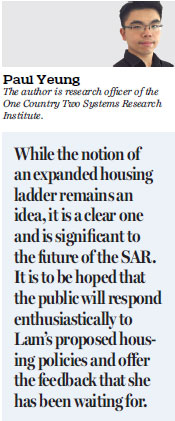Expanded housing ladder can help homeownership
Updated: 2017-03-03 06:58
By Paul Yeung(HK Edition)
|
|||||||||
Paul Yeung argues that the public have considerable expectations for Carrie Lam, who has emerged as front-runner in the CE race, and people expect her to provide practical solutions to the housing issue
In the face of high public expectations, Carrie Lam Cheng Yuet-ngor released her full election manifesto early this week, shedding further light on her policy platform's priorities.
The land and housing issue is high on the priority list, as she had already told an election rally early last month.
Lam hopes to improve the homeownership situation in Hong Kong. She said she would rebuild the home-buying ladder, letting families at different income levels own a home. Plans include increasing the supply of Green Form Subsidised Home Ownership Pilot Scheme (GSH) units.
This scheme offers subsidized flats for sale to public rental housing occupants whose financial circumstances have improved. She also proposed introducing "starter homes" at affordable prices for families who were not eligible for the Home Ownership Scheme but could not afford properties in the private market.

Lam proposed "rebuilding the ladder for home buying" as she recognized that home prices were already beyond the reach of average buyers. The idea is to help Hong Kong residents, especially young homebuyers, live a contented life. Indeed, the significance of an expanded "housing ladder" is much more than that.
First, restoring the housing ladder will release more public rental housing units from occupants who buy their own flats to those who are still on the waiting list.
As we know, the Housing Authority has set a target of offering any qualified applicant a public rental housing unit within three years. However, the target has been exceeded in recent years and the average waiting time is now estimated at 4.7 years.
The long waiting time is a testament to the severe shortage of public rental housing. Aside from building more public rental units, a faster turnover rate for existing flats is another way to boost availability. The proposed increase in the supply of GSH units would help boost turnover.
Second, expanding the housing ladder would provide more homes for households of various income levels. Currently, there are three main layers on the housing ladder - the GSH, the Home Ownership Scheme (HOS), and private housing.
The HOS bears the heavy burden of tackling the housing needs of the so-called sandwich class. Lam proposed creating a new layer of subsidized housing above the HOS, for middle-class permanent residents and first-time homebuyers.
She hoped to provide affordable housing for young professionals who had no property but whose incomes were too high for public housing. With a new housing ladder, the government could set different criteria and terms for different schemes to meet the specific needs of different income levels.
Last but not least, the idea of a "housing ladder" itself can provide a clear blueprint for housing planning and winning public support for land development. The key to the success of any housing proposal lies in whether the community is willing to make some difficult decisions in allocating untapped land for housing development.
The proposed housing ladder, which is able to meet the housing needs of different social strata, will gain stronger public support.
Being widely seen as front-runner in the Chief Executive race, the public has placed high hopes on Carrie Lam. She is expected to provide more practical solutions to the housing issue.
While the notion of an expanded housing ladder remains an idea, it is a clear one and is significant to the future of the special administrative region. It is to be hoped that the public will respond enthusiastically to Lam's proposed housing policies and offer the feedback that she has been waiting for.
Lam has made it known that she envisions a "new style" of governance that is to be inclusive and to embrace civic engagement in policy setting, with the ultimate goal of reaching broader community consensus.
The Chief Executive is a key political figure in the SAR, whose policies have strong impact on the overall well-being of residents. Even though not every one of us has a vote this time, as the opposition camp vetoed in 2015 the electoral reform package for implementing universal suffrage, we should respond actively to the ideas proposed by the candidates to help them assemble a better manifesto.
(HK Edition 03/03/2017 page1)